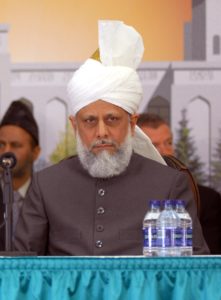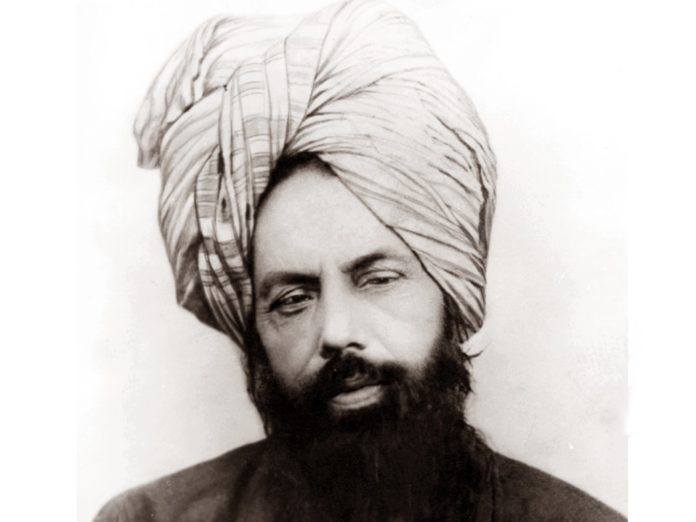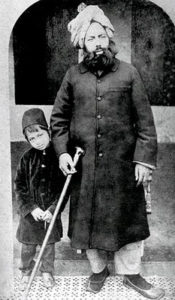The founder of the Ahmadiyya Movement, Mirza Ghulam Ahmad, was born on February 13, 1835. Considered heretics by mainstream Muslims, the Ahmadis claim to represent the “true Islam” and say that their founder was the “Promised Messiah.”
In 1891 in British-ruled India a man made an extraordinary statement. He claimed he was the Messiah, an embodiment of the spirit of Prophet Isa (pbuh), and went on to state that Prophet Isa died a natural death in Kashmir and did not ascend to heaven as Muslims believe.
Later in his life some say he even declared himself a Prophet. All the quotes below have been taken from official Ahmadi sources:
“There has not been a single Prophet of whose qualities or circumstances I have not been bestowed a portion …” Mirza Ghulam Ahmad
“In short, my prophethood is due to my being Muhammad and Ahmad and not by myself: I have been vouchsafed this rank because of my complete annihilation in the Holy Prophet.”
“He who differentiates between me and Mustafa (Prophet Muhammad (pbuh)) has neither known me nor seen me…”
“I have claimed to be the like of the Messiah in the light of revelation from Allah the Glorious and it has also been disclosed to me that there are references to me in the Holy Qur’an and in the ahadith of the Holy Prophet and a promise has been made concerning my advent.” Mirza Ghulam Ahmad
Subscribe to our newsletter and stay updated on the latest news and updates from around the Muslim world!
“In 1891 in Qadian, Hazrat Mirza Ghulam Ahmad(as) received repeated revelations that Jesus (as) of Nazareth, in whose second advent both the Muslims and Christians believed, had died a natural death and that what was meant by his second advent was that a person should appear in the spirit of Jesus and that he himself was that person, the Promised Messiah (as).”
“The Promised Messiah has mentioned that one time he saw Krishna in a dream. He was of dark colour, had a thin nose and a wide forehead. Krishna got up and touched his nose and forehead with his nose and forehead. Hadhrat Ahmad received the following two revelations: ‘O Krishna the cherisher of cows thy praise is written in the Gita’… ‘King of Aryas (Hindus) has arrived.’ Hadhrat Ahmad explained that God had called him Krishna and King of Aryas in these revelations. Thus he claimed he was like Krishna for the Hindus.”
“There is no doubt about the benefits and blessings which the British rule has brought to us, nor can anyone question the unparalleled peace and liberty which it has established in this country, but most people have not made a right use of this liberty and peace. Instead of being thankful to God for His great obligation in placing us under the benign rule of such a peaceful and kind Government, most people have become utterly neglectful of and stolidly indifferent to God…”
The Ahmadiyya Movement
Mirza Ghulam Ahmad was born in 1835 and today is the anniversary of his birth. He was the founder of the Ahmadiyya movement which began as a small group numbering a handful of followers and today has millions of adherents worldwide.
The movement and its current leader Mirza Masroor Ahmed are based in London where they broadcast a 24 hour satellite television channel and have a number of places of worship. His followers are known as Ahmadis, or colloquially as Qadianis or Mirzai. They have prominent representation within the British government and are referred to as “Muslims” by the mainstream media.
Ahmad himself was born into a wealthy and influential Muslim family in the town of Qadian in British-ruled Punjab, and as a child he studied Quranic Arabic and Persian. His father arranged for him to take up employment as a clerk in the British-administered government and was keen for Ahmad to become a civil servant. However, Ahmad had little interest or the requisite aptitude to pursue such a career and after a short lived period of employment returned home at his father’s request in 1868.
Yet this period would prove crucial to the development of the Ahmadiyya movement as it brought him into contact with Christian missionaries and members of the Arya Samaj, a Hindu propagation group, with whom he began to debate and discuss religion.
On his return home he studied various religions and built a reputation as a Muslim debater and defender. At a time when Islam was under attack from evangelical activity, his speeches and writings were initially welcomed by Muslims.
His claims of divine revelations began after the death of his father. They are documented in the many books, pamphlets and speeches Ahmad wrote and gave during his lifetime. He said various parts from the Qur’an and Hadith gave legitimacy to his claims, and he also wrote of several revelations concerning the death or downfall of his rivals.
The Ahmadiyya community was formally founded a few years later when Ahmad told his followers he received divine guidance indicating they should make Bayyah (a pledge of allegiance to him).
Jihad and the Ahmadiyya
Ahmad saw himself as a Mujadidd, a Muslim leader who comes to prominence at the end of each century to revive and renew Islam, cleansing and purifying the faith.
He redefined the term “jihad” as a solely personal battle to purify oneself. He maintained jihad cannot be used to defend oneself militarily against foreign rule where religious freedoms are given by an oppressor. Nor can it be used defensively to protect one’s land and resources.
Since the movement came into existence the Ahmadiyya have argued that Islam is not being attacked militarily thus the conditions for a military jihad are not met, arguing the “jihad of the pen” promoted by its founder is the only legitimate form of defending Islam.
Opponents argue this narrative was formed during a time of authoritarian rule by the British in the Indian subcontinent and a backdrop of increasing agitation for independence following the Indian Mutiny of 1857. They believe the Ahmadiyya position on jihad lent support to continued British subjugation.

Many say the British government installed Ahmad as an “apostolic prophet” to create divisions amongst Indian Muslims and extinguish the religious legitimacy of armed resistance. They view the Ahmadiyya as collaborators in colonial rule, although the Ahmadiyya maintain they were neither founded nor funded by the British.
Ahmad spent the remainder of his life promoting his beliefs and building the Ahmadiyya movement. He was declared a heretic during his lifetime and many of his writings were deemed blasphemous by religious scholars. He died in 1908 from natural causes according to his followers, whilst his opponents believe he died from dehydration due to a bout of cholera. He remains even in death a controversial figure.
Today his followers in the Ahmadiyya movement argue the status of “sub prophethood” does not affect the status of Final Prophethood accorded to Prophet Muhammad (pbuh). However, the movement is split – the majority ascribes some sort of prophethood to Ahmad whilst a smaller splinter group, the Lahore Ahmadiyya Movement, believes he was a saint-like figure and not a prophet.
Mainstream Islam
On the other hand, all mainstream Muslim scholars are unanimous that Ahmad’s claims are in direct conflict with Islam, which states Prophet Muhammad (pbuh) was the final Prophet and none will come after him. Therefore, the Ahmadiyya community falls firmly outside the fold of Islam for mainstream Muslims of all sects.
For example, the World Muslim League says the Ahmadiyyah “is a subversive movement against Islam and the Muslim world, which falsely and deceitfully claims to be an Islamic sect, who under the guise of Islam and for the sake of mundane interests contrives and plans to damage the very foundations of Islam. Its eminent deviations from the basic Islamic principles are as follows: Its founder claimed that he was a Prophet. They deliberately distort the meanings of the verses of the Holy Quran. They decalred that Jihad has been abolished.
“Qadianism was originally fostered by the British imperialism. Hence it has been flourishing under her flag. This movement has completely been disloyal to and dishonest in affairs of the Muslim Ummah. Rather, it has been loyal to Imperialism and Zionism.”
In 1976 Pakistan formally declared Ahmadiyya as “non-Muslims” and in 1984 General Muhammad Zia-ul-Haq issued the anti-Ahmadiyya Ordinance XX which effectively prohibited Ahmadis from preaching or professing their beliefs.
A recent report by the All Party Parliamentary Group for the Ahmadiyya Muslim Community urged the government to pressure Pakistan to reverse its anti-Ahmadi laws.
It said: “The same organisations and preachers in Pakistan who promote anti-Ahmadi Muslim hatred, and which have their roots in the early populist movements which were relevant at the time of the formation of Pakistan (such as Majlis-e-Ahrar and Khatme Nabuwwat) have been allowed into the United Kingdom to preach…
“In schools and universities in the UK, Ahmadi Muslims regularly experience prejudice and pressure from other Muslims students. Hate preachers with a public record of anti-Ahmadi hatred have been allowed into the UK and hate-preaching organisations in Pakistan have been allowed to set up as registered charities in the UK…”
Nevertheless, the mainstream Islamic position remains that Ahmedis are non-Muslims, as expressed by the Muslim Council of Britain in 2016:
“The Muslim Council of Britain reflects the clear theological position expressed across Islamic traditions: namely that the cornerstone of Islam is to believe in One God and in the finality of the prophethood of the Messenger Muhammad, peace be upon him. We understand that this is not a tenet subscribed to by the Ahmadi community. The MCB Constitution requires our affiliates to declare that Messenger Muhammad peace be upon him is the final prophet and whoever does not subscribe to that declaration cannot be eligible for affiliation with the MCB. Given this fundamental theological difference with the Ahmadi community, the MCB is not in a position to represent or be represented by the Ahmadi community.
“Despite our clear theological beliefs, we note that pressure is mounting to describe this community as Muslim. Muslims should not be forced to class Ahmadis as Muslims if they do not wish to do so, at the same time, we call on Muslims to be sensitive, and above all, respect all people irrespective of belief or background.”



















